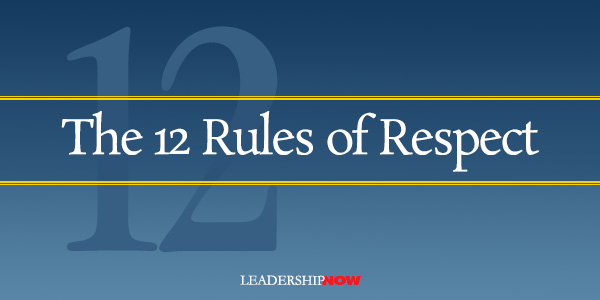The 12 Rules of Respect

Paul Meshanko has highlighted the importance of demonstrating respect in all of our interactions in
The Respect Effect. The desired result is that those we interact with will feel valued in some way. He offers 12 Ways of thinking and behaving around others:
1. Be Aware of Your Nonverbal and Extra-verbal Cues.
What we say is important but how we say it can make or break the communication. “Extra-verbal cues include the speed with which we speak, our volume relative to background noise, our inflection, and our willingness to pause to make space for others to speak.”
2. Develop Curiosity About the Perspectives of Others.
“Empathy is demonstrated when it becomes evident to others around us that we are interested in what they think, why they think it, and how they feel about it. When this happens, it becomes easier to communicate respect to others, even if we disagree with them.”
3. Assume that Everyone is Smart About Something.
“Because I like to think I’m smart, it is reasonable to assume that other people like to think they are also smart. The only difference is that we are all smart through different histories and life experiences.”
4. Become a Better Listener by Shaking Your “But.”
The word “but” can be used in a way that hinders our ability to show respect. The word “but” negates what came before it. Replacing it with “and” and other words that validate and convey consideration, the entire tone is changed.
5. Look for Opportunities to Connect with and Support Others.
“Even in the heat of conflict, there are ways to connect with people if we want to. When we demonstrate a willingness to move away from our immediate agenda and search for positions of agreement first, it makes working through the actual differences a bit easier.”
6. When You Disagree, Explain Why.
“It is disrespectful when we fail to share our observations and opinions in order to avoid conflict. We have an obligation to others to be truthful with our perspectives and points of view. When done with civility, tact, and room for counterarguments, sharing our perspectives leads to the best decisions and optimal results. It also prevents the accumulation of ‘baggage’ that builds up when we keep things bottled up.” And remember, it works both ways.
7. Look for Opportunities to Grow, Stretch, and Change.
“As we develop the desire and the willingness to hold ourselves up to the proverbial ‘bright light’ for an occasional reality check, two things happen. First, we become infinitely easier to be around because we are less critical of others. Second, we grow in wisdom and perspective. That’s because we start considering that, in situations where we might initially view others critically, the problems may be ours to deal with and not theirs.
8. Learn to Be Wrong on Occasion.
“From a neurological perspective, there is absolutely no correlation between our degree of certainty about a subject and the likelihood that we are actually correct in our beliefs. This means that our feeling of certainty about something is nothing more than a strong emotion. The stronger the emotion, the more likely we are to develop blind spots around it.” An open mind is a demonstration of respect.
9. Never Hesitate to Say You Are Sorry.
“Unfortunately, it is often when we’re at our worst that our actions are most memorable to others. While we don’t expect everybody to be perfect, “we do expect people to make it right when their words, actions, or decisions cause damage.”
10. Intentionally Engage Others in Ways that Build Their Self-Esteem.
“Building esteem in people we work with or for requires a shift in agendas. It takes a shift in focus away from what we need to what others need.” Meshanko colleague Teresa Welborne said, “If you are in a leadership position and you are not a people person, you become a liability to your organization. And if you’re not willing to make the effort to become a people person, you should not be in a position of leadership.”
11. Be Respectful of Time When Making Comments.
“If we don’t become curious or have value for what other people have to say, it is difficult to consistently fake the behaviors that demonstrate interest.”
12. Smile!
“Sometimes the most effective strategies are also the simplest. With rare exceptions, when we meet people who greet us with a smile, they are sending us important information about their intentions.”
Meshanko concludes with 3 key ingredients to improving your ability to demonstrate respect for others:
Respect is about you and me, not “them,” and our commitment to it influences everyone around us. Once we understand the value proposition respect offers, that insight can provide us with patience, courage, and creativity.
Patience permits us to maintain our composure and respectful demeanor when others are not acting at their best.
Courage enables us to candidly challenge disrespectful behavior and actions directed toward others.
Creativity allows us to see points of connection, even in the midst of conflict.
When we bring these qualities online and into our work interactions, everyone benefits, including our peers, customers, vendors, and ultimately, our shareholders.
* * *

Like us on
Instagram and
Facebook for additional leadership and personal development ideas.
* * *




Posted by Michael McKinney at 11:13 PM
Permalink
| Comments (0)
| This post is about Personal Development



 Paul Meshanko has highlighted the importance of demonstrating respect in all of our interactions in The Respect Effect. The desired result is that those we interact with will feel valued in some way. He offers 12 Ways of thinking and behaving around others:
Paul Meshanko has highlighted the importance of demonstrating respect in all of our interactions in The Respect Effect. The desired result is that those we interact with will feel valued in some way. He offers 12 Ways of thinking and behaving around others:






